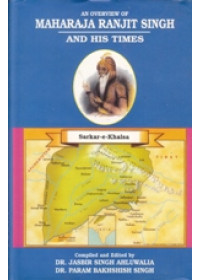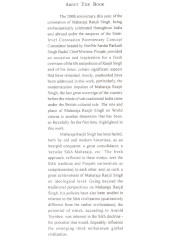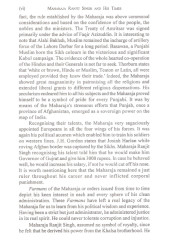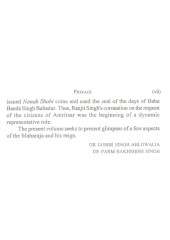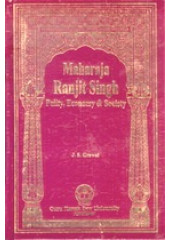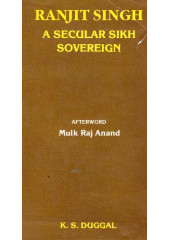Monday to Saturday - 10:00 Am to 9 PM
Now Enjoy Bulk Discounts on Books as Mentioned Below
These Discounts are in addition to the Discounts on Individual Books (Visible as Bulk Discount for Books in Cart)
Extra 10% Off If Books Purchased Exceeds Rs 3000 or 75 USD or 60 GBP or 60 Euro or 100 AUD or 100 CAD
Extra 15% Off If Books Purchased Exceeds Rs 6000 or 150 USD or 120 GBP or 120 Euro or 200 AUD or 200 CAD
Extra 20% Off If Books Purchased Exceeds Rs 15000 or 225 USD or 180 GBP or 180 Euro or 300 AUD or 300 CAD
Extra 25% Off If Books Purchased Exceeds Rs 30000 or 300 USD or 240 GBP or 240 Euro or 400 AUD or 400 CAD
Introduction of 'Maharaja Ranjit Singh and His Times - Sarkar - E - Khalsa' - Book By Dr Jasbir Singh Ahluwalia and Dr. Parambakhshish Singh
The 200th anniversary, this year, of the coronation of Maharaja Ranjit Singh, being enthusiastically celebrated throughout India and abroad under the auspices of the State-level Coronation Bicentenary Concept Committee headed by Hon'ble Sardar Parkash Singh Badal, Chief Minister, Punjab, provided an occasion and inspiration for a fresh overview of the life and policies of Ranjit Singh and of his times; certain significant aspects that have remained, mostly, unattended have been addressed in this work, particularly, the modernization impulses of Maharaja Ranjit Singh, the last great sovereign of the country before the whole of sub-continental India came under the British colonial rule. The role and place of Maharaja Ranjit Singh on World canvas is another dimension that has been, so forcefully for the first time, highlighted in this work.
Maharaja Ranjit Singh has been hailed, both by old and modern historians, as an interpid conqueror, a great consolidator, a 'secular Sikh Maharaja, etc' The fresh approach, reflected in these essays, sees the Sikh tradition and Punjabi nationalism as complementary to each other, and, as such, a great achievement of Maharaja Ranjit Singh on ideological level. Going beyond the traditional perspectives on Maharaja Ranjit Singh, his policies have also been studied in relation to the Sikh civilization (qualitatively different from the earlier civilizations), the potential of which, according to Arnold Toynbee. was inherent in the Sikh doctrine -the potential that would, hopeably, influence the emerging third millennium global civilization.
Preface To The Book 'Maharaja Ranjit Singh and His Times - Sarkar - E - Khalsa' - Book By Dr Jasbir Singh Ahluwalia and Dr. Parambakhshish Singh
Maharaja Ranjit Singh, a legendary figure, appears to be somewhat larger than history. He possessed the superb qualities of a born ruler. M'Gregor in 1846 remarked that he was no common character but possessed power of mind rarely met with either in Eastern or Western world.
Assessing the political acumen of Maharaja Ranjit Singh, General J.H. Gordon argues that the Maharaja's reign was one long campaign in consolidating his power. By 1831, after repeated attempts, he had at last brought into subjection the Muslim provinces of Multan, Kashmir and Peshawar, the Rajput hill states and all other independent chiefs. His supremacy was extended to the foothills beyond the Indus, to Ladakh in Tibet beyond Kashmir and to the snowy Himalayas in the north. Furthermore, he safeguarded his people, his kingdom, the honour of his beloved country from the hammar-like onslaught of the British.
Maharaja Ranjit Singh possessed rare statesmanship and invariably evaluated the situation with meticulous care and farsightedness. Only one example will suffice here. Seeing that the Phulkian chief had taken protection under the East India Company, he accepted Sutlej as his boundary in 1809 by the Treaty of Amritsar. Though he felt that it was a great hurdle and obstruction in his ambitious designs yet he soon brought his mind to see the great advantage which this treaty secured him. He was sagacious enough to direct his whole force in other directions where he had yet many foes to overcome and to pursue his policy of reducing to subjection all Sardars and Muslim chiefs within the regime having intention of resistence and defiance.
The Maharaja had full faith in the broad based fellowship and co-ordination with which the Hindus and the Muslims created conditions of peace and prosperity to which John Malcolm calls a system most congenious to the temperament of the subjects. In fact, the rule established by the Maharaja was above communal considerations and based on the confidence of the people, the nobles and the ministers. The Treaty of Amritsar was signed primarily under the advice of Faqir Azizuddin. It is interesting to note that Alahi Bakhsh, Muslim remained the incharge of artillery force of the Lahore Darbar for a long period. Basawan, a Punjabi Muslim bore the Sikh colours in the victorious and significant Kabul campaign. The evidence of the whole hearted co-operation of the Hindus and their Generals is not far to seek. Thorburn states that 'white or brown, Hindu or Muslim, Teuton or Latin, all were employed provided they knew their trade.' Indeed, the Maharaja showed great magnanimity in patronising all the religions and extended liberal grants to different religious dispensations. His secularism endeared him to all his subjects and the Maharaja proved himself to be a symbol of pride for every Punjabi. It was by means of the Maharaja's strenuous efforts that Punjab, once a province of Afghanistan, emerged as a sovereign power on the map of India.
Recognising their talents, the Maharaja very sagaciously appointed Europeans in all the four wings of his forces. It was again his political acumen which enabled him to train his soldiers on western lines. J.H. Gordon states that Josiah Harlan while roving Afghan border was captured by the Sikhs. Maharaja Ranjit Singh recognising his talent told him that he would make him Governor of Gujrat and give him 3000 rupees. In case he behaved well, he would increase his salary, if not he would cut off his nose. It is worth mentioning here that the Maharaja remained a just ruler throughout his career and never inflicted corporal punishment.
Farmans of the Maharaja or orders issued from time to time depict his keen interest in each and every sphere of his clean administration. These Farmans have left a real legacy of the Maharaja for us to learn from his political wisdom and experience. Having been a strict but just administrator, he administered justice in its real spirit. He could never tolerate corruption and injustice.
Maharaja Ranjit Singh, assumed no symbol of royalty, since he felt that he derived his power from the Khalsa brotherhood. He issued Nanak Shahi coins and used the seal of the days of Baba Banda Singh Bahadur. Thus, Ranjit Singh's coronation on the request of the citizens of Amritsar was the beginning of a dynamic representative rule.
The present volume seeks to present glimpses of a few aspects of the Maharaja and his reign.
DR JASBIR SINGH AHLUWALIA DP PARM BAKHSHISH SINGH
Table Of Contents 'Maharaja Ranjit Singh and His Times - Sarkar - E - Khalsa' - Book By Dr Jasbir Singh Ahluwalia and Dr. Parambakhshish Singh
| CONTENTS | ||
| Preface Dr Jasbir Singh Ahluwalia, | ||
| Parm Bakhshish Singh | (v) | |
| 1 | Maharaja Ranjit Singh on | |
| World Canvas Dr Jasbir Singh Ahluwalia | 1 | |
| 2 | Sukarchakia Misal: | |
| Its Rise and Fall Bhagat Singh | 10 | |
| 3 | Character and Personality | |
| of Maharaja Ranjit Singh Bhagat Singh | 60 | |
| 4 | The External Policy of Maharaja Ranjit Singh | |
| (1799-1839) Jean-Marie Lafont | 86 | |
| 5 | The Legacy of Ranjit Singh Amrik Singh | 99 |
| 6 | The Dynamics of Maharaja | |
| Ranjit Singh's Policies Gurbachan Singh Nayyar | 108 | |
| 7 | Maharaja Ranjit Singh: | |
| Secular Perceptions Shiv Kumar Gupta | 115 | |
| 8 | Punjabi Language and Literature during the times | |
| of Maharaja Ranjit Singh Tarlok Singh Anand | 128 | |
| 9 | Jewels and Relics in Maharaja Ranjit Singh's | |
| Toshakhana Mohinder Singh | 136 | |
| 10 | Maharaja Ranjit Singh's Contribution to Architectural | |
| Heritage Sarbjot Singh Behl | 146 | |
| 11 | Special Lecture on | |
| Maharaja Ranjit Singh Jean-Marie Lafont | 158 | |
Maharaja Ranjit Singh and His Times - Sarkar - E - Khalsa - Book By Dr Jasbir Singh Ahluwalia and Dr. Parambakhshish Singh
- Brand: Punjabi-University-Patiala
- Product Code: ESE134
- Availability: Out Of Stock
-
Rs.300.00
Related Products
Maharaja Ranjit Singh - The State and Society - Book By Indu Banga & J S Grewal
Foreword To The Book 'Maharaja Ranjit Singh - The State and Society' By Indu Banga & J S Grewal ..
Rs.500.00
Maharaja Ranjit Singh and His Times - Book By H S Chopra
Foreword To The Book 'Maharaja Ranjit Singh and His Times' By H S Chopra Maharaja Ranjit Singh's ..
Rs.350.00
Maharaja Ranjit Singh - Polity - Economy and Society - Book By J S Grewal
Foreword To The Book 'Maharaja Ranjit Singh - Polity - Economy and Society' -Book By J S Gr..
Rs.300.00
Sunset of The Sikh Empire - Book by Sita Ram Kohli
Table of Contents For 'Sunset of The Sikh Empire' - Book by Sita Ram Kohli ..
Rs.425.00
Ranjit Singh - A Secular Sikh Sovereign - Book By Mulk Raj Anand
From The Frontcover Of 'Ranjit Singh - A Secular Sikh Sovereign' By Mulk Raj Anand Maharaja..
Rs.300.00
The Life Story Of Maharaja Ranjit Singh - Book By Surinder Singh Johar
Preface To 'The Life Story Of Maharaja Ranjit Singh' By Surinder Singh Johar Maharaja Ranjit Sing..
Rs.350.00
Tags: book by dr jasbir singh ahluwali, maharaja ranjit singh and his ti times, sarkar, khalsa, ahluwalia, dr., parambakhshish, eminent, sikhs, warriors, martyrs, books, english

